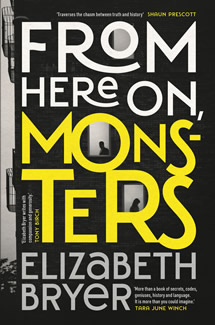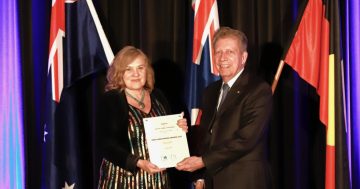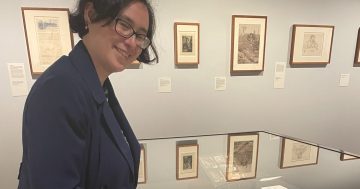Reviewed by Robert Goodman.
By Elizabeth Bryer, Picador.
 Elizabeth Bryer starts her new novel From Here on, Monsters with a reference to Franz Kafka’s The Trial. And while the novel never descends to a point where one might call it Kafka-esque, the influence of the Czech writer can be felt peeking through from time to time along with echoes of the early existential works of American author Paul Auster. But this is neither of those, Bryer has delivered something that while influenced by plenty that have come before it, is distinct original, universal but also very Australian.
Elizabeth Bryer starts her new novel From Here on, Monsters with a reference to Franz Kafka’s The Trial. And while the novel never descends to a point where one might call it Kafka-esque, the influence of the Czech writer can be felt peeking through from time to time along with echoes of the early existential works of American author Paul Auster. But this is neither of those, Bryer has delivered something that while influenced by plenty that have come before it, is distinct original, universal but also very Australian.
Cameron Raybould is a book seller in a small city bookshop that she essentially inherited from its previous owner. As a sideline she also values book collections. When the book opens she is given the potential of a job offer by a famous artist – Maddison Worthington. Not long after that she is given a strange manuscript and finds a homeless man sleeping in her shop. That man, Jhon, is a refugee and is connected to a group of others who are camping out in a secret room above the top floor of the building in which she has the shop. Before long Cameron is working for Maddison and has offered Jhon a job in her shop while he translates the manuscript for her. And then things start to get weird.
To talk too much more about this book would be to give away some of the surprises including mythical monsters (possibly), a mirror bookshop, and a transformative (not in a good way) art piece called Excise our Hearts. While the pieces are there it slowly becomes clear that Bryer is talking about the Australian experience and more specifically, our relationship with migrants and refugees. The title, From Here On, Monsters, refers to the old maps of the world in which the lower portion (in which Australia would later be located) was blank and titled with that inscription. And while Bryer digs into the Australian experiences, the question of how Western countries see and treat refugees has become a widespread one.
Bryer is particularly interested in the use of language. How naming things in a different way can change their nature. In this case, potentially making things literally disappear. When Maddison is caught out potentially plagiarising another artist, the discussion is not about the ethics or otherwise of this behaviour but how the ensuing press release could throw Maddison back into a good light. Maddison does not run, she does not apologise, she uses a story to reframe the debate and get her off the hook.
From Here On, Monsters makes its many points by mashing a number of elements. There is the historical tale told in the manuscript which is itself about a manuscript, a critique of the art world, an exploration of the power of language, the slightly surrealist elements like the mirror bookshop, and at one point a scene that plays as what might be actual monsters terrorising a group of people. But it works. And it works in a way that highlights its through line which is really about the difference between treating people as tools or objects and actually showing compassion for our fellow human beings. And the importance of language in facilitating or blunting that compassion. And on that score From Here On, Monsters is a winner.
This and over 400 more reviews can be found on Pile By the Bed.











